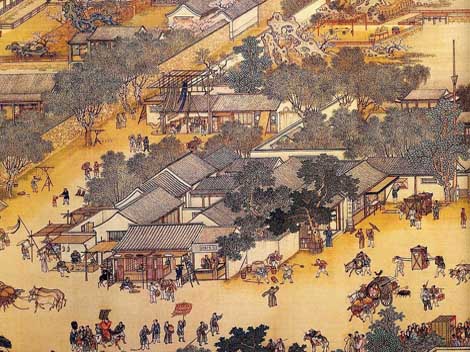History of China

More than a million years ago, primitive human beings lived on the land now called China. About 400,000 to 500,000 years ago, the Peking Man, a primitive man that lived in Zhoukoudian southwest of Beijing, was able to walk with the body erect, to make and use simple tools, and use fire. Six to seven thousand years ago, the people living in the Yellow River valley supported themselves primarily with agriculture, while also raising livestock. More than 3,000 years ago these people began smelting bronze and using ironware.
In China, slave society began around the 21st century B.C. Over the next 1,700 years, agriculture and animal husbandry developed greatly and the skills of silkworm-raising, raw-silk reeling and silk-weaving spread widely. Bronze smelting and casting skills reached a relatively high level, and iron smelting became increasingly sophisticated. The Chinese culture flourished, as a great number of thinkers and philosophers emerged, most famously Confucius.
In 221 B.C., Qin Shi Huang, the first emperor of the Qin Dynasty, established a centralized, unified, multi-national feudal state. This period of feudal society continued until after the Opium War in 1840. During these 2,000 years, China's economy and culture continued to develop, bequeathing a rich heritage of science and technology, literature and the arts. The four great inventions of ancient China - paper-making, printing, the compass and gunpowder - have proved an enormous contribution to world civilization. Chinese civilization peaked at Tang Dynasty (618-907) when Tang people traded with people all over the world.
In China, slave society began around the 21st century B.C. Over the next 1,700 years, agriculture and animal husbandry developed greatly and the skills of silkworm-raising, raw-silk reeling and silk-weaving spread widely. Bronze smelting and casting skills reached a relatively high level, and iron smelting became increasingly sophisticated. The Chinese culture flourished, as a great number of thinkers and philosophers emerged, most famously Confucius.
In 221 B.C., Qin Shi Huang, the first emperor of the Qin Dynasty, established a centralized, unified, multi-national feudal state. This period of feudal society continued until after the Opium War in 1840. During these 2,000 years, China's economy and culture continued to develop, bequeathing a rich heritage of science and technology, literature and the arts. The four great inventions of ancient China - paper-making, printing, the compass and gunpowder - have proved an enormous contribution to world civilization. Chinese civilization peaked at Tang Dynasty (618-907) when Tang people traded with people all over the world.

